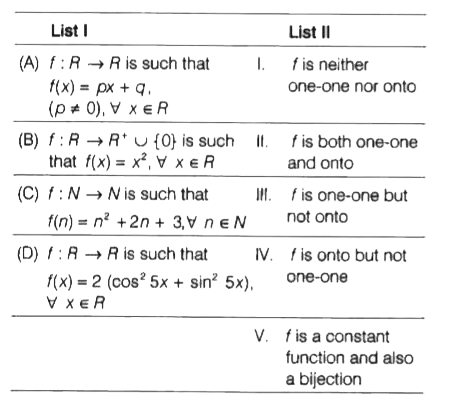Let f(x) be continuous on [0, 4] , differentiable on (0, 4) , f(0) = 4 and f(4) = -2 . If g(x)=f(x)x+2 , then the value of g'(c ) for some Lagrange's constant c∈(0,4) is Solution in Telugu
12
512
−512
−712
The correct Answer is:D
Step by step video, text & image solution for Let f(x) be continuous on [0, 4] , differentiable on (0, 4) , f(0) = 4 and f(4) = -2 . If g(x) =(f(x))/(x + 2) , then the value of g'(c ) for some Lagrange's constant c in (0 , 4) is by Maths experts to help you in doubts & scoring excellent marks in Class 12 exams.
Updated on:21/07/2023Topper's Solved these Questions
Similar Questions
Match the following

The correct answer is
View SolutionAn equation of a line whose segment between the coordinates axes is divided by the point (12,13) in the ratio 2:3 is
View SolutionLet f(x) be differentiable for real x such that f′(x)>0on(−∞,−4), f′(x)<0on(−4,6), f′(x)>0on(6,∞), If g(x)=f(10−2x), then the value of g′(2) is a. 1 b. 2 c. 0 d. 4
View SolutionA function f is differentiable in the interval 0
View SolutionLet f(x)=e^(x)g(x),g(0)=4 and g'(0)=2, then f'(0) equals
View SolutionLet f(x) be a function such that,f(0)=f'(0)=0,f''(x)=sec^(4)x+4 then the function is
View SolutionLet f:(−5,5)→R be a differentiable function of with f(4)=1,f'(4)=1,f(0)=−1andf'(0)=Ifg(x)=(f(2f2(x)+2))2, then g'(0) equals
View SolutionLet f:(−5,5)→R be a differentiable function of with f(4)=1,f'(4)=1,f(0)=−1andf'(0)=Ifg(x)=(f(2f2(x)+2))2, then g'(0) equals
View SolutionLet f and g be continuous functions on [ 0 , a] such that f(x)=f(x)=f(a−x)andg(x)+g(a−x)=4, then ∫a0f(x)g(x)dx is equal to
View SolutionIf f(x)=f(4−x),g(x)+g(4−x)=3 and ∫40f(x)dx=2, then : ∫40f(x)g(x)dx=
View SolutionLet f(x) be continous on [0,6] and differentable on (0,6) Let f(0)=12 and f(6)=-4. If g(x) =f(x)x+1 then for some Lagrange's constant c∈ (0,6),g'( c)=
View SolutionLet f(x) be continuous on [0, 6] and differentiable on (0, 6). Let f(0) = 12 and f(6)=−4.
If g(x)=f(x)x+1, then for some Lagrange's constant c∈(0,6),g'(c)=
View SolutionLet f(x) be continuous on [0, 6] and differentiable on (0, 6). Let f(0) = 12 and f(6)=−4.
If g(x)=f(x)x+1, then for some Lagrange's constant c∈(0,6),g'(c)=
View SolutionIf f(x) and g(x) are continuous functions on the interval [0, 4] satisfying f(x)=f(4−x) and g(x)+g(4−x)=3 and ∫40f(x)dx=2 then ∫40f(x)g(x)dx=
View SolutionLet f and g be continuous fuctions on [0, a] such that f(x)=f(a−x) and g(x)+g(a−x)=4 then ∫a0f(x)g(x)dx is equal to
View Solution
